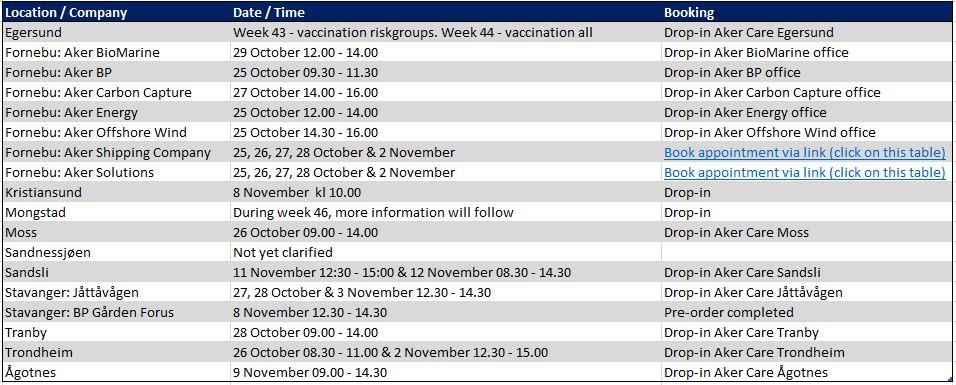This Year’s Influenza Vaccine – 2021
Autumn is here, and the yearly influenza vaccine is soon available through Aker Care. It is difficult to predict how the flu season 2021/22 will turn out, but the Norwegian Institute of Public Health (FHI) has considered that this year’s influenza may be more severe than earlier.
The risk groups for influenza and Covid-19 are partly overlapping. It is not always possible to distinguish clinical signs of the two diseases. It is also possible to be infected with both viruses at the same time. The flu vaccine is only effective against influenza virus infection and will not protect against covid-19. Vaccination is nevertheless important to avoid serious influenza illness and reduce the risk of double infection with influenza and covid-19.
We especially encourage employees in the risk groups to take this year’s influenza vaccine (see list of risk groups below)
This year’s influenza vaccine will be available through Aker Care from week 43, please see table below for details per location:
The vaccine is free of charge for permanent employees, externals/hired-ins will be charged 400,- NOK for the vaccine.
Please note that before you can get the vaccine you need to fill in a self-declaration form. Please print, fill in the form and bring with you. The English version is on page 2. The form will also be available in the clinic/ place of vaccination.
Vaccination is one of the most effective preventive measures against influenza. Although the influenza vaccine may not provide complete protection against infection for everyone, the disease will be shorter lived and milder after vaccination. You should preferably get the influenza vaccine in October or November. You will be fully protected after one to two weeks.
Risk groups who are recommended to get vaccinated:
- People 65 years or older
- Pregnant women in their second and third trimester. Vaccination of women in their first trimester can be considered if they have additional risk factors for complications from influenza
- Children and adults with:
- Diabetes type 1 and type 2
- Chronic respiratory diseases
- Chronic cardiovascular diseases
- Chronic liver failure
- Chronic renal failure
- Chronic neurological disease or injury
- Weakened immune systems
- Obesity (BMI over 40)
- Other severe or chronic illness evaluated on an individual basis by a doctor
Side effects from inactivated vaccines usually begin shortly after vaccination and rarely after two days. There is no evidence that the influenza vaccine can cause serious medical problems. Most common side effects are local reaction with redness, tenderness and/or swelling at the injection site (5 – 20 %), symptoms such as fever, muscle aches and general malaise (1 – 10 %) Serious side effects are extremely rare, but most common are allergic reactions (hives, anaphylaxis).
Source. Folkehelseinstituttet.
